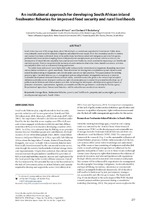| dc.contributor.author | Hara, Mafaniso | |
| dc.contributor.author | Backeberg, Gerhard | |
| dc.date.accessioned | 2014-09-10T09:11:27Z | |
| dc.date.available | 2014-09-10T09:11:27Z | |
| dc.date.issued | 2014 | |
| dc.identifier.citation | Hara, M. & Backeberg, G. (2014). An institutional approach for developing South African inland reshwater fisheries for improved food security and rural livelihoods. Water SA, 40(2): 277-286 | en_US |
| dc.identifier.issn | 0378-4738 | |
| dc.identifier.uri | http://hdl.handle.net/10566/1240 | |
| dc.description.abstract | South Africa has over 4 700 storage dams, about 700 of which are owned and controlled by Government. Public dams were primarily constructed for domestic, irrigation and industrial water supply. Over time secondary uses for recreation and tourism have been established. Many of the public dams have been stocked with indigenous and alien fish species, predominantly for recreational angling. Given widespread rural unemployment, poverty and undernourishment, the development of inland fisheries on public dams and natural water bodies has much potential for improving rural livelihoods and food security. There is also potential for inclusion of communities in other value chains linked to economic activities around public dams such as recreational fishing and tourism. The public dams and natural water bodies fall under various implicit institutional arrangements depending on primary and secondary activities on a given water body. These determine the existing formal and informal power dynamics and related decision-making arrangements and controls under current use-right practices. This paper analyses the existing property rights that determine access, co-management options and governance arrangements necessary to promote sustainable development of inland fisheries in South Africa. Attention needs to be given to the various ways of explicit definition and enforcement of property and access rights if communities are to realise the potential benefits from use of public dams for fisheries and other economic activities. Achieving this will require a developmental approach based on principles of inclusive, representative, equitable, accountable and effective governance. Leadership by the line agency – Department of Agriculture, Forestry and Fisheries – will be critical for success of such an initiative. | en_US |
| dc.language.iso | en | en_US |
| dc.publisher | Water Research Commission | en_US |
| dc.rights | © 2014 Water Research Commission. This file may be freely used provided that the source is acknowledged. No commercial distribution of this text is permitted. | |
| dc.source.uri | http://dx.doi.org/10.4314/wsa.v40i2.10 | |
| dc.subject | South Africa | en_US |
| dc.subject | Storage dams | en_US |
| dc.subject | Poverty and livelihoods | en_US |
| dc.subject | Freshwater fisheries | en_US |
| dc.subject | Developmental approach | en_US |
| dc.subject | Governance | en_US |
| dc.subject | Property and access rights | en_US |
| dc.title | An institutional approach for developing South African inland freshwater fisheries for improved food security and rural livelihoods | en_US |
| dc.type | Article | en_US |
| dc.privacy.showsubmitter | false | |
| dc.status.ispeerreviewed | true | |
| dc.description.accreditation | Web of Science | en_US |

